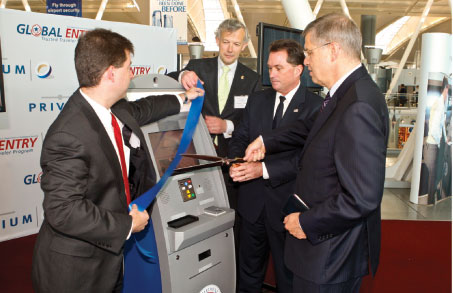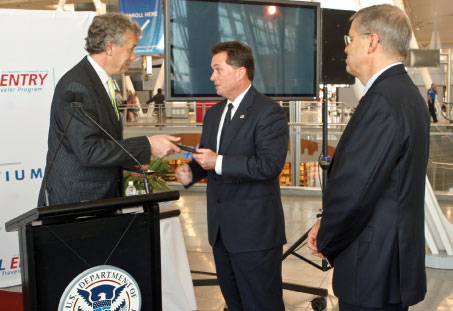 The arrangement is a significant step and is a first for the US with a nation outside North America. “This partnership recognises that our mutual goals of security and economic vitality can best be met when burdens are shared,” said U.S. Customs and Border Protection Acting Commissioner, Jayson P. Ahern. “Both nations have learned that pre-screening low-risk travellers is a great way to ensure that we can give adequate attention to those we don’t know who may present a risk.”
The arrangement is a significant step and is a first for the US with a nation outside North America. “This partnership recognises that our mutual goals of security and economic vitality can best be met when burdens are shared,” said U.S. Customs and Border Protection Acting Commissioner, Jayson P. Ahern. “Both nations have learned that pre-screening low-risk travellers is a great way to ensure that we can give adequate attention to those we don’t know who may present a risk.”

On 24 April, the US and the Netherlands formally launched a landmark initiative, known as FLUX, to open membership of their expedited air travel programmes to citizens of both countries. Pictured are: Schiphol CEO Jos Nijhuis, CBP Commissioner Jayson Ahern, and Dutch Minister of Justice Ernst Hirsch Ballin.
Membership of the US programme – Global Entry – is limited to those considered low-risk after a rigorous background check, interview and biometric capture. Once approved, members can use a kiosk at airports in New York, Washington DC, Houston, Los Angeles, Atlanta, Chicago and Miami to streamline the entry process; identification is confirmed by fingerprints. To become a member of the Netherlands’ Privium programme, which is available at Amsterdam Airport Schiphol, travellers are subject to an extensive background check. The programme provides members with faster border passage through an iris scan. “In a world with growing numbers of travellers and a strong demand for border control and safety, the United States and the Netherlands have managed to promote mobility for well-intentioned travellers, without making concessions to safety and security,” said Dutch Minister of Justice Ernst Hirsch Ballin. “We have done so by trusting each other and by using innovative technology. I am pleased with what we have jointly achieved and hope more countries will join us in the future.”

The Flux Initiative has so far exceeded expectations, with 400 people applying for membership in only the first four weeks.
‘Trusted countries’ concept
Together with the Netherlands and US governments, Dartagnan – a Schiphol Group daughter company – came up with the idea for FLUX and worked in partnership with US/Netherlands Border Control authorities to develop and implement the Alliance. More specifically, it worked on concept and service development as well as on the technical and operational frameworks.
The initiative has been in development for almost four years since the first dialogue between the two countries. FLUX is a concept of ‘trusted countries’. Countries that join the FLUX Alliance agree on the type of risk assessment and criteria that applicants have to meet in order to qualify for membership of the respective local service programmes that offer fast border passage. “At the end of the day each country has to trust the other country performing the agreed risk assessment on each applicant. It has taken a while for both countries to align the type of checks between one another,” said Dartagnan director Nanne Onland. “With FLUX, the security of both individual programmes becomes even stronger.”
On a voluntary basis, travellers have their background checked by countries participating in the FLUX Alliance in exchange for facilitated border passage in these countries. Only a “red light/green light” message is exchanged between participating countries the traveller has selected. Because of these stringent upfront checks and special procedures, Global Entry and Privium is now available to FLUX Alliance participating country nationals. “The FLUX Alliance is based on reciprocity: each country that has automated border passage opens up these facilities to the citizens of other participating countries,” said Onland. “The common interest has always been to facilitate the flow of low-risk travellers and to stimulate transatlantic trade and travel. The pay off of the initiative is therefore: Seamless Travel, Simplifying Business.”
One-stop-shop application
Onland reports that FLUX has performed beyond expectation; 400 travellers applied in the first four weeks, based only on media reports, and already there has been great interest from business travel agencies, airlines and airports. The first campaign directed at travellers will begin in mid-June, with a marketing campaign to existing Privium members.
Onland explained that the key benefits for travellers include faster border passage in participating countries (currently 7 US airports and Amsterdam Airport Schiphol) – border passage takes 15 seconds in the Netherlands and 40 seconds in the US, excluding potential waiting time for gates/kiosks. FLUX also provides one-stop-shop application and enrolment for multiple countries, and no more immigration and customs forms to fill in on the way to the US. “For travellers it doesn’t make sense to apply with each individual country and to have separate interviews/enrolments for each program. FLUX makes life a lot easier: one application and one enrolment to get access to the fast border passage facilities of all countries that participate in the FLUX Alliance,” said Onland. “For authorities, there is more security because of risk assessment from the ‘home nation’ and exchange of background screening results between those countries that the traveller has selected.”
Privium was a registered traveller programme to begin with, to which EEA citizens could become a member if they passed a regular passport control check. Risk assessments and background checks were not part of the procedure. “These had to be implemented. Also the exchange of information between countries within the FLUX Alliance is based on specific protocols that had to be implemented. Quite some work has been performed since the start,” said Onland.
The FLUX Alliance has its own set of terms and conditions that apply in addition to the existing Global Entry and Privium requirements.
The Flux Initiative has so far exceeded expectations, with over 500 people applying for membership in only the first four weeks. While, currently, only the US’ Global Entry Program and the Netherlands’ Privium programme are part of the FLUX Alliance and as such meet the criteria for participation, more countries with Automated Border Passage facilities have shown interest in joining the Alliance and linking their local programmes to an international network. “The way forward is that of multilateral growth rather than a great number of bilateral agreements,” said Onland.







